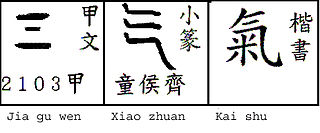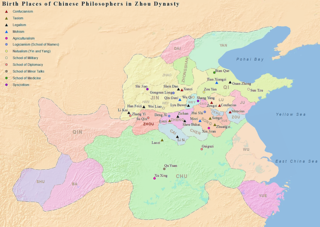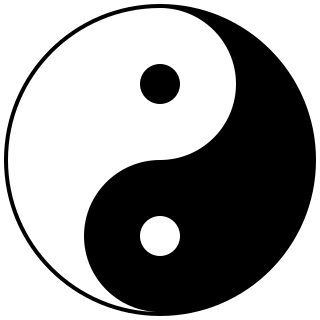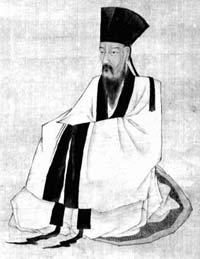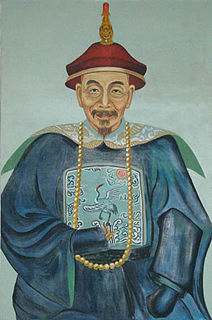This article needs attention from an expert in Philosophy/Eastern.(November 2008) |
Li (理, pinyin lǐ )is a concept found in Neo-Confucian Chinese philosophy. It refers to the underlying reason and order of nature as reflected in its organic forms.

Chinese philosophy originates in the Spring and Autumn period and Warring States period, during a period known as the "Hundred Schools of Thought", which was characterized by significant intellectual and cultural developments. Although much of Chinese philosophy begins in the Warring States period, elements of Chinese philosophy have existed for several thousand years; some can be found in the Yi Jing, an ancient compendium of divination, which dates back to at least 672 BCE. It was during the Warring States era that what Sima Tan termed the major philosophical schools of China: Confucianism, Legalism, and Taoism, arose, along with philosophies that later fell into obscurity, like Agriculturalism, Mohism, Chinese Naturalism, and the Logicians.
Contents
It may be translated as "rational principle" or "law." It was central to Zhu Xi's integration of Buddhism into Confucianism. Zhu Xi held that li, together with qi (氣: vital, material force), depend on each other to create structures of nature and matter. The sum of li is the Taiji .

A principle is a proposition or value that is a guide for behavior or evaluation. In law, it is a rule that has to be or usually is to be followed, or can be desirably followed, or is an inevitable consequence of something, such as the laws observed in nature or the way that a system is constructed. The principles of such a system are understood by its users as the essential characteristics of the system, or reflecting system's designed purpose, and the effective operation or use of which would be impossible if any one of the principles was to be ignored. A system may be explicitly based on and implemented from a document of principles as was done in IBM's 360/370 Principles of Operation.
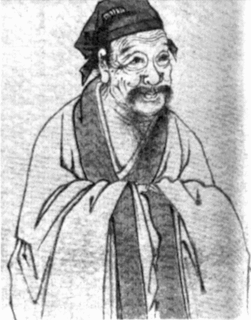
Zhu Xi, also known by his courtesy name Yuanhui, and self-titled Hui'an, was a Chinese philosopher, politician, and writer of the Song dynasty. He was a Confucian scholar who founded what later became known as the "learning of principle" or "rationalist" school and was the most influential Neo-Confucian in China. His contributions to Chinese philosophy including his editing of and commentaries to the Four Books, which later formed the curriculum of the civil service exam in Imperial China from 1313 to 1905; and his emphasis on the process of the "investigation of things" and mediation as a method for self cultivation. He has been described by scholar Edward Slingerland as the second most influential thinker in Chinese history, after Confucius himself.

Buddhism is the world's fourth-largest religion with over 520 million followers, or over 7% of the global population, known as Buddhists. Buddhism encompasses a variety of traditions, beliefs and spiritual practices largely based on original teachings attributed to the Buddha and resulting interpreted philosophies. Buddhism originated in ancient India as a Sramana tradition sometime between the 6th and 4th centuries BCE, spreading through much of Asia. Two major extant branches of Buddhism are generally recognized by scholars: Theravada and Mahayana.
This idea resembles the Buddhist notion of li, which also means "principle." Zhu Xi maintained, however, that his notion is found in I Ching (Book of Changes), a classic source of Chinese philosophy. Zhu Xi's school came to be known as the School of Li, which is comparable to rationalism. To an even greater extent than Confucius, Zhu Xi had a naturalistic world-view. His world-view contained two primary ideas: qi and li. Zhu Xi further believed that the conduct of the two of these took places according to Tai Ji.

The I Ching or Yi Jing, also known as Classic of Changes or Book of Changes, is an ancient Chinese divination text and the oldest of the Chinese classics. Possessing a history of more than two and a half millennia of commentary and interpretation, the I Ching is an influential text read throughout the world, providing inspiration to the worlds of religion, psychoanalysis, literature, and art. Originally a divination manual in the Western Zhou period (1000–750 BC), over the course of the Warring States period and early imperial period (500–200 BC) it was transformed into a cosmological text with a series of philosophical commentaries known as the "Ten Wings". After becoming part of the Five Classics in the 2nd century BC, the I Ching was the subject of scholarly commentary and the basis for divination practice for centuries across the Far East, and eventually took on an influential role in Western understanding of Eastern thought.
In philosophy, rationalism is the epistemological view that "regards reason as the chief source and test of knowledge" or "any view appealing to reason as a source of knowledge or justification". More formally, rationalism is defined as a methodology or a theory "in which the criterion of the truth is not sensory but intellectual and deductive".
Holding to Confucius and Mencius' conception of humanity as innately good, Zhu Xi articulated an understanding of li as the basic pattern of the universe, stating that it was understood that one couldn't live without li and live an exemplary life. In this sense, li according to Zhu Xi is often seen as similar to the Dao in Daoism or to telos in Greek philosophy and also to the Dharma in Hinduism . Wang Yangming, a philosopher who opposed Zhu Xi's ideas, held that li was to be found not in the world but within oneself. Wang Yangming was thus more of an idealist with a different epistemic approach.
Tao or DaoDOW; from Chinese: 道; pinyin: Dào(

Taoism, or Daoism, is a religious or philosophical tradition of Chinese origin which emphasizes living in harmony with the Tao. The Tao is a fundamental idea in most Chinese philosophical schools; in Taoism, however, it denotes the principle that is the source, pattern and substance of everything that exists. Taoism differs from Confucianism by not emphasizing rigid rituals and social order, but is similar in the sense that it is a teaching about the various disciplines for achieving "perfection" by becoming one with the unplanned rhythms of the universe called "the way" or "dao". Taoist ethics vary depending on the particular school, but in general tend to emphasize wu wei, "naturalness", simplicity, spontaneity, and the Three Treasures: 慈 "compassion", 儉 "frugality", and 不敢為天下先 "humility".

Ancient Greek philosophy arose in the 6th century BC and continued throughout the Hellenistic period and the period in which Ancient Greece was part of the Roman Empire. Philosophy was used to make sense out of the world in a non-religious way. It dealt with a wide variety of subjects, including astronomy, mathematics, political philosophy, ethics, metaphysics, ontology, logic, biology, rhetoric and aesthetics.

